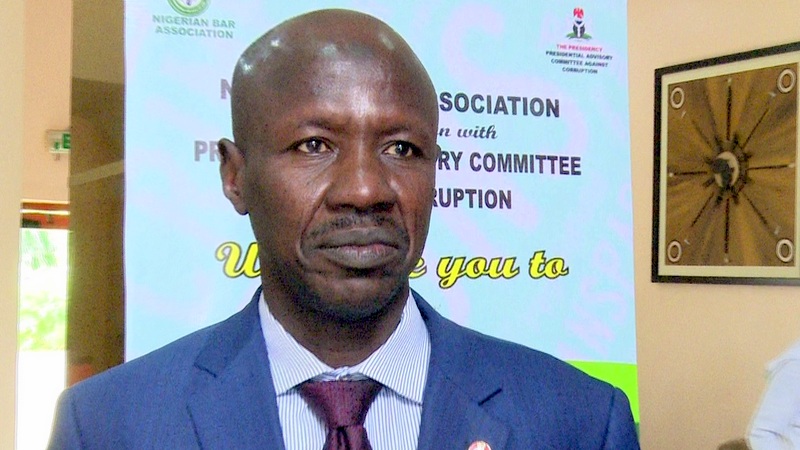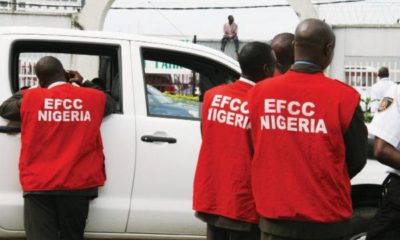- Magu Came to Beg me for Confirmation, Saraki Tells CJ
Former Senate President Bukola Saraki says the acting Chairman of the Economic and Financial Crimes Commission, Mr. Ibrahim Magu, visited him in 2016 and begged him to ensure that he was confirmed by the Senate.
Saraki added that he explained to Magu that the Department of State Services had written a letter to the upper chamber of the National Assembly accusing the EFCC boss of corruption and being unfit to hold the office and thus should not be confirmed.
The former Senate President said this in a letter addressed to the Chief Judge of the Federal High Court, Justice Adamu Abdu-Kafarati.
Saraki’s letter was written in response to a previous letter written by the EFCC to the chief judge.
The EFCC in a letter sent to Abdu-Kafarati, on May 21, accused Justice Taiwo Taiwo of being biased against it.
Saraki had filed a fundamental human rights suit before Justice Taiwo who in turn granted an ex parte order restraining the commission and five other agencies of the Federal Government from continuing its investigations of certain corruption allegations against him.
However, in a protest letter signed by Magu, the EFCC requested the re-assignment of the two ex-governors’ cases and all other ones involving it in the judge’s docket to another judge of the court.
In his own letter, however, Saraki said the EFCC was after him because Magu believed he had a hand in his confirmation.
The letter read in part, “Your Lordship, Mr. Magu after his nomination, came to see me pleading that I should do my best to help him during the screening process. During that meeting, I made it clear that I had no objection to his nomination and revealed to him, in confidence that he needed to go and clear himself with the DSS because the report on him was unfavourable.
“In fact, I bent backwards to let him read the content of the indicting security report submitted on him.
Also, I decided to delay the screening to give him ample time to get the DSS to change the report. As it eventually turned out, he was unable to get the adverse DSS report reversed.”
Saraki, who was the Chairman of the 8thNational Assembly, said the acting EFCC boss had since been hounding him.
He said the DSS actually sent two reports against Magu and it was the belief of the agency that confirming the nomination of such a man would be inimical to the war against corruption.
The former Senate President wrote, “My Lord, Mr. Magu is after me because he feels that as the President of the 8th Senate, I was responsible for the non-confirmation of his appointment, whereas the reason his appointment was not confirmed is all too familiar: an agency of the executive, which nominated him, the DSS, sent two reports to the Senate in which it categorically stated that Magu failed the integrity test, that his confirmation would shackle the EFCC from effectively tackling corruption in the country and hampering the anti-corruption drive of the President Muhammadu Buhari administration.”
He said it was in a bid to ensure transparency that the Senate allowed Magu’s screening to be aired live on television.
Saraki, who was governor of Kwara State from 2003 to 2011, urged the CJ to ignore the EFCC’s request even as he added that all the allegations levelled against him were not different from the charges filed before the Code of Conduct Tribunal which were quashed by the Supreme Court.
The former Senate President said it was funny that of all the agencies which were restrained by the court, it was only the EFCC that was attacking a judicial officer for doing his job among the six defendants goes to show that the commission and its leadership are “unnecessarily mischievous, pugnacious and overzealous.”
He, therefore, asked the CJ to ignore the EFCC’s petition


 Naira3 weeks ago
Naira3 weeks ago
 News4 weeks ago
News4 weeks ago
 Naira4 weeks ago
Naira4 weeks ago
 Naira3 weeks ago
Naira3 weeks ago
 Jobs3 weeks ago
Jobs3 weeks ago
 Travel3 weeks ago
Travel3 weeks ago
 Naira3 weeks ago
Naira3 weeks ago
 Investment4 weeks ago
Investment4 weeks ago



























